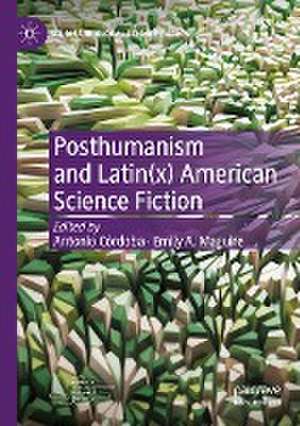Posthumanism and Latin(x) American Science Fiction: Studies in Global Science Fiction
Editat de Antonio Córdoba, Emily A. Maguireen Limba Engleză Paperback – 25 noi 2023
| Toate formatele și edițiile | Preț | Express |
|---|---|---|
| Paperback (1) | 778.01 lei 6-8 săpt. | |
| Springer International Publishing – 25 noi 2023 | 778.01 lei 6-8 săpt. | |
| Hardback (1) | 783.20 lei 6-8 săpt. | |
| Springer International Publishing – 25 noi 2022 | 783.20 lei 6-8 săpt. |
Preț: 778.01 lei
Preț vechi: 948.79 lei
-18% Nou
Puncte Express: 1167
Preț estimativ în valută:
148.89€ • 154.87$ • 122.92£
148.89€ • 154.87$ • 122.92£
Carte tipărită la comandă
Livrare economică 14-28 aprilie
Preluare comenzi: 021 569.72.76
Specificații
ISBN-13: 9783031117930
ISBN-10: 303111793X
Ilustrații: XIII, 257 p. 2 illus.
Dimensiuni: 148 x 210 mm
Greutate: 0.33 kg
Ediția:1st ed. 2023
Editura: Springer International Publishing
Colecția Palgrave Macmillan
Seria Studies in Global Science Fiction
Locul publicării:Cham, Switzerland
ISBN-10: 303111793X
Ilustrații: XIII, 257 p. 2 illus.
Dimensiuni: 148 x 210 mm
Greutate: 0.33 kg
Ediția:1st ed. 2023
Editura: Springer International Publishing
Colecția Palgrave Macmillan
Seria Studies in Global Science Fiction
Locul publicării:Cham, Switzerland
Cuprins
Introduction: “Posthumanism and Speculative Aesthetics in Latin(x) American Science Fiction”.- Chapter 1. “Prosthetic Futures: Disability and Genre Self-Consciousness in Maielis González Fernández’s Sobre los nerds y otras criaturas mitológicas.” Ana Ugarte Fernández, College of the Holy Cross.- Chapter 2. “We Have Always Been Posthuman: Virtus and the Reconfiguration of the Lettered Subject.” Miguel García, Fordham University.- Chapter 3. “Does the Posthuman Actually Exist in Mexico? A Critique of the Essayistic Production on the Posthuman Written by Mexicans (2001-2007).” Stephen Tobin, UCLA.- Chapter 4. Maia Gil’Adi, “Fukú, Postapocalyptic Haunting, and Science-Fiction Embodiment in Junot Díaz’s ‘Monstro.’” Maia Gil’Adi, University of Massachusetts-Lowell.- Chapter 5. “Villa Epecuén: Slow Violence and the Posthuman Film Set.” Jonathan Risner, Indiana University.- Chapter 6. Catfish and Nanobots: Invasive Species and Eco-Critical Futures in Alejandro RojasMedina’s Chunga Maya, Samuel Ginsburg, Washington State University.- - Chapter 7. “Cyborgs in the Margins: Indigeneity in ‘El Cementerio de Elefantes,’ by Miguel Esquirol.” Liliana Colanzi, Cornell University.- Chapter 8. “Race, Performance and the Discipline of the Body in Brazil’s Dystopian Thriller 3%.” M. Elizabeth Ginway, University of Florida.- Chapter 9. “Bruja Theory: On Witches and Worldmaking.” William Orchard, Queens College of the City University of New York.- Afterword: “Posthuman Subjectivity in Latin America: Changing the Conversation.” Silvia Kurlat Ares.
Notă biografică
Antonio Córdoba is Associate Professor of Modern Languages and Literatures at Manhattan College, USA. His main area of specialization is Latin American and Iberian science fiction. He has published ¿Extranjero en tierra extraña?: El género de la ciencia ficción en América Latina (2011) and published articles and book chapters on Latin American and Spanish science fiction and horror.
Emily A. Maguire is Associate Professor of Spanish and Portuguese at Northwestern University, USA, where she specializes in literature of the Hispanic Caribbean and its diasporas. The author of Racial Experiments in Cuban Literature and Ethnography (2011; 2nd edition, 2018), her articles have appeared in Revista de Estudios Hispánicos, Small Axe, A Contracorriente, ASAP/Journal, and Revista Iberoamericana, among other places.
Textul de pe ultima copertă
This volume explores how Latin American and Latinx creators have engaged science fiction to explore posthumanist thought. Contributors reflect on how Latin American and Latinx speculative art conceptualizes the operations of other, non-human forms of agency, and engages in environmentalist theory in ways that are estranging and open to new forms of species companionship. Essays cover literature, film, TV shows, and music, grouped in three sections: “Posthumanist Subjects” examines Latin(x) American iterations of some of the most common figurations of the posthuman, such as the cyborg and virtual environments and selves; “Slow Violence and Environmental Threats” understands that posthumanist meditations in the hemisphere take place in a material and cultural context shaped by the catastrophic destruction of the environment; the chapters in “Posthumanist Others” shows how the reimagination of the self and the world that posthumanism offers may be an opportunity to break the hold that oppressive systems have over the ways in which societies are constructed and governed.
Antonio Córdoba is Associate Professor of Modern Languages and Literatures at Manhattan College, USA. His main area of specialization is Latin American and Iberian science fiction. He has published ¿Extranjero en tierra extraña?: El género de la ciencia ficción en América Latina (2011) and published articles and book chapters on Latin American and Spanish science fiction and horror.
Emily A. Maguire is Associate Professor of Spanish and Portuguese at Northwestern University, USA, where she specializes in literature of the Hispanic Caribbean and its diasporas. The author of Racial Experiments in Cuban Literature and Ethnography (2011; 2nd edition, 2018), her articles have appeared in Revista de Estudios Hispánicos, Small Axe, A Contracorriente, ASAP/Journal, and Revista Iberoamericana, among other places.
Caracteristici
Includes essays on US, Mexico, the Caribbean, the Andean region, Brazil, and the Southern cone Studies literature, film, and TV at the intersection of posthumanism and speculative art Demonstrates that the texts can be understood as sources of Latinx thought in their own right












